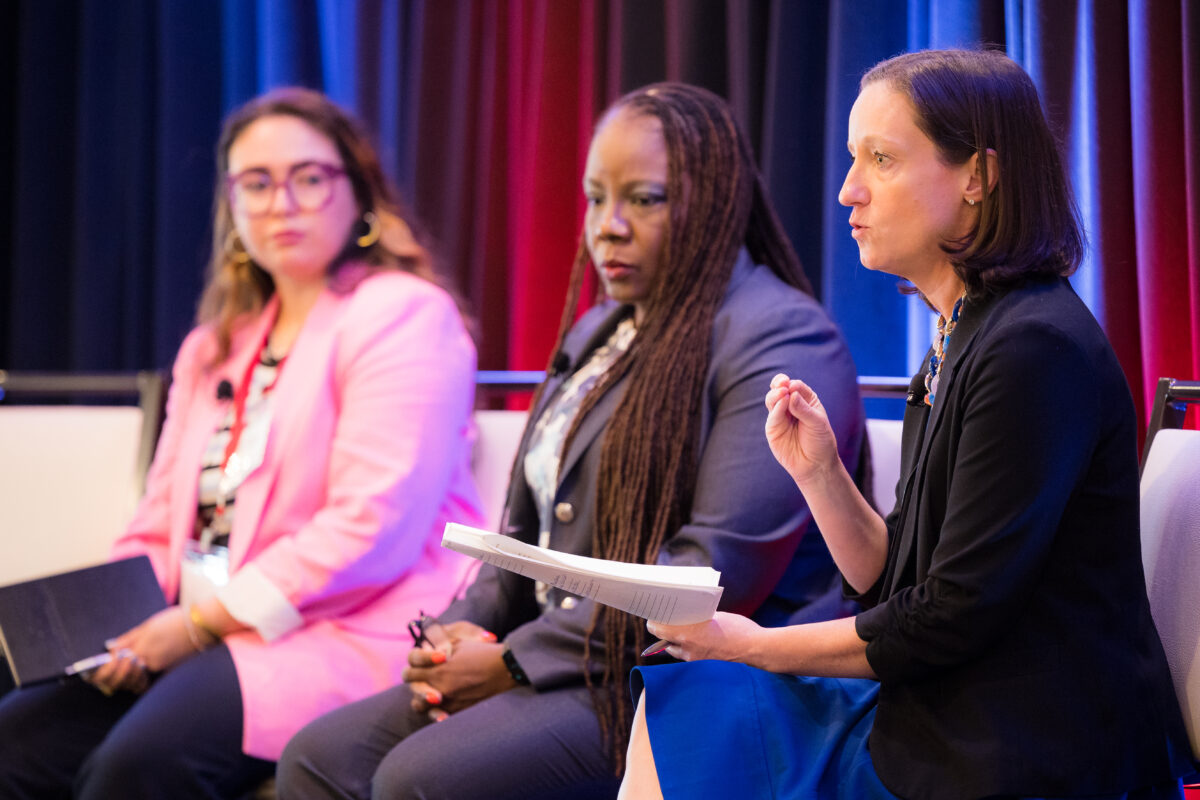A Year of Impact for IHEP
Published Dec 20, 2023
As the year draws to a close, we at the Institute for Higher Education Policy (IHEP) are taking a moment to reflect on the strides we’ve made and the work left to do to advance our mission – building a more equitable and just society through higher education. In 2023 we partnered with many of you, conducted compelling research, engaged in meaningful advocacy, and led purposeful field engagement. We welcomed new colleagues, celebrated a long-time equity champion, and commemorated 30 years of advancing equitable college access and success.
Thank you for engaging with our work, sharing your insights and for YOUR ongoing commitment to supporting student success. Together, we are helping more students – especially Black, Latinx, Indigenous, Asian American, Native Hawaiian, and Pacific Islander communities and students living with low incomes – experience the transformative benefits of postsecondary education.
New Research
This year our researchers delved into critical higher education issues, producing timely insights that shaped national discourse and informed policy solutions:
- We joined Results for America to release Recommendations to Inform the Department of Education’s Research and Evaluation Set-Aside Authority, a listing of actionable steps that can be implemented to support equity-focused research and evaluations on what works in higher education, for whom, and under what circumstances.
- Our Implementing a Student-Level Data Network (Part IV): Exploring Design Options explores three potential designs and considerations for implementing a federal student-level data network.
- We partnered with HCM Strategists to support 24 institutions in three states through TransferBOOST (Bachelor’s Opportunity Options that are Straightforward and Transparent), an initiative to provide students affordable, quality, well-supported two- to four-year degree pathways. Insights from the initiative informed a research series with actionable recommendations for institutional and state higher education leaders.
- We published Rising Above the Threshold: How Expansions in Financial Aid Can Increase the Equitable Delivery of Postsecondary Value for More Students, an in-depth analysis that leverages publicly available data and the Postsecondary Value Framework to estimate that 2,414 institutions typically deliver a minimum economic return to students. It also outlines policy interventions to improve affordability and postsecondary value.
- We updated the Equitable Value Explorer, an online tool that provides new insights on disaggregated student earnings and announced a new research series that will explore the economic benefits of a college degree coming in 2024.
- Our research brief with The Campaign for College Opportunity, Ensuring Fairness in College Admissions: Rethinking Recruitment, Demonstrated Interest Strategies, Early Decision, and Legacy Admissions, offers college leaders and admissions officials clear recommendations to increase access for those historically excluded or underrepresented in higher education.
Policy and Advocacy
We engaged with federal, state, and institutional policymakers, to advance policies that improve data, access, affordability, and quality in higher education. We continue to move the needle on the bipartisan, bicameral College Transparency Act. Thirty-nine Representatives and 27 Senators cosponsor the legislation, and more than 150 organizations endorse it. Through our Postsecondary Data Collaborative, we’ve mobilized the field by leading 14 advocacy letters on topics ranging from the reauthorization of the Education Sciences Reform Act to the U.S. Department of Education’s Request for Information regarding their Financial Value Transparency Framework postsecondary programs to a call to protect and preserve critical Institute for Education Sciences data collections. In the wake of the U.S. Supreme Court’s ruling on race-conscious admissions, IHEP called on institutions to rethink policies and practices in ways that prioritize diversity and equity. And we defined the policy priorities that will guide our future work.
 Community and Field Engagement
Community and Field Engagement
Many of our policy-relevant insights derive from engagement with experts working day-in and day-out on campuses and in state agencies across the country, so I’m especially proud of our deepening collaboration with higher education practitioners. For instance, we convened researchers, policymakers and practitioners through our Postsecondary Value Community of Practice, which highlighted progress within the Equitable Value Movement and showcased data-driven strategies to boost student success and postsecondary value. We convened a learning cohort to equip practitioners with tools to leverage their expertise to shape policy development. And we hosted an informational session to amplify the federal Postsecondary Student Support Grant program and help institutions secure additional resources to scale evidence-based completion strategies.
Welcoming New Expertise and Perspectives
In 2023, we welcomed a talented group of new staff members to the IHEP team:
Chimére Dickson, Operations and Project Manager, Lauren McLeese, Research Analyst, Sean Tierney, Director of Research and Policy; Marián Vargas, Senior Research Analyst, and we welcomed back two IHEP alumni: Kelly Leon, Vice President of Communications and Government Affairs and Gabrielle Smith Finnie, Research Intern. We also onboarded Dr. Brian Bridges, Secretary of Higher Education for the state of New Jersey, as a new Board member. These individuals bring a wealth of expertise and diverse perspectives to our work, building out the incredible strength of the IHEP team.
As we move into 2024, we carry with us the momentum and achievements of 2023 and set our sights high for the change we seek in the year ahead. Through rigor, collaboration, and an equity-centric approach, we will continue our commitment to advance equitable outcomes and generational impact for communities historically marginalized on the basis of race, ethnicity, or income. Thank you for your interest in our work, your partnership, and most important—your commitment to our nation’s students.



